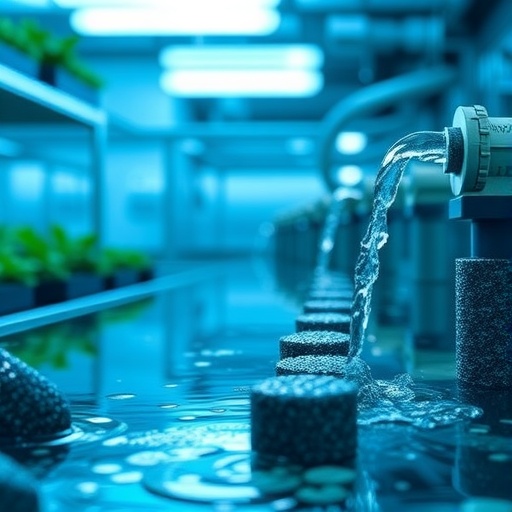In a groundbreaking study led by researchers at Princeton University, the use of reclaimed wastewater as a feasible source for hydrogen production through electrolysis has been demonstrated, potentially transforming the landscape of hydrogen energy. This innovative approach not only addresses the pressing issue of water scarcity but also significantly reduces the costs associated with hydrogen production, thereby paving the way for more sustainable energy practices in industries that are traditionally hard to electrify.
Historically, the production of hydrogen, particularly through the green hydrogen electrolysis process, has been heavily reliant on ultrapure water. The need for such water has posed significant challenges, not only due to its high treatment costs but also because it competes with local freshwater resources, which are increasingly scarce. The research team, headed by Z. Jason Ren, has now successfully shown that treated wastewater can be an effective substitute, effectively eliminating a crucial bottleneck in hydrogen production.
The study reveals that the electrolytic process, which splits water into hydrogen and oxygen gas using renewable energy, can utilize reclaimed wastewater without the stringent requirement for ultrapure water. This is a substantial advance, as it allows for the repurposing of treated wastewater from local treatment plants, a readily available resource in virtually every community. This method could lead to significant reductions in both the economic and environmental costs associated with hydrogen generation.
The experimental research involved testing the performance of a proton exchange membrane electrolyzer with purified water versus treated wastewater. The results illuminated some critical issues related to the rapid decline in performance when using reclaimed water. Ren’s team, through meticulous diagnostic experiments and advanced imaging techniques, identified that the presence of certain ions, particularly calcium and magnesium, significantly impaired the electrolysis process by clogging the specialized membrane used in the electrolyzer.
These ions, commonly known for causing scale buildup in household plumbing, were found to hinder the transport of hydrogen ions, reducing the electrolyzer’s efficiency. However, the research team proposed a simple yet effective countermeasure: acidifying the reclaimed wastewater with sulfuric acid. By doing this, they created an acidic environment that favored the required proton transport, allowing hydrogen production to proceed at a stable and continuous rate.
The results of the acidification strategy were remarkable. The newly acidified wastewater enabled more than 300 hours of uninterrupted operation, significantly exceeding prior attempts that typically failed after short intervals. Ren emphasizes the importance of this breakthrough, indicating that traditional methods of cleaning water to create ultrapure solutions are both costly and environmentally taxing. By contrast, the use of slightly acidified reclaimed wastewater presents a much more sustainable and cost-effective solution.
Economic analysis carried out by the research team suggested that this method could reduce the overall costs of treating water for hydrogen production by an eye-opening 47%, while also decreasing the energy costs associated with this treatment by approximately 62%. This dual advantage is crucial as the demand for clean energy sources continues to grow, and every bit of cost savings can make hydrogen a more appealing option for industries striving to decarbonize.
The implications of this research extend beyond mere cost savings. By tapping into the vast resources of treated wastewater, the hydrogen production infrastructure can become more resilient and widely distributed. Every town and city has access to wastewater treatment facilities, allowing for localized hydrogen production that minimizes transport costs and reduces overall environmental impact. This is a particularly salient point as urban areas seek to adopt sustainable practices while addressing their energy requirements.
Looking forward, Ren and his team are actively collaborating with industry partners to explore the scalability of their findings and consider the integration of pretreated seawater in the hydrogen production process. The prior research published by the group has already laid down a framework for optimizing water and cost savings, identifying prime locations within the United States for pairing hydrogen production facilities with wastewater treatment plants. This strategic approach could streamline operations and enhance the efficiency of resource use.
As they study the broader implications of their hydrogen strategy, the team at Princeton is keen to emphasize the balance between technical advancements and larger-scale analytical perspectives. Their research embodies a confluence of scientific inquiry and practicality, aiming to meet both theoretical and industry needs in the pursuit of a sustainable energy future. The commitment to using reclaimed water for hydrogen production demonstrates a proactive stance toward resource management, aligning with global ambitions for sustainability and energy independence.
In conclusion, the research spearheaded by Princeton University sets a new standard for hydrogen production methods. By leveraging treated wastewater and utilizing a novel acidification method, they have not only made notable strides in reducing costs but have also created a more sustainable pathway for future hydrogen production. As the world pivots toward more sustainable energy solutions, this study underscores the importance of innovation in overcoming traditional barriers and driving significant progress in the clean energy sector.
Subject of Research: Hydrogen production from reclaimed wastewater
Article Title: Electrolytic hydrogen production from acidified wastewater effluent
News Publication Date: 24-Sep-2025
Web References: https://www.sciencedirect.com/science/article/pii/S0043135425015751
References: Not applicable
Image Credits: Bumper DeJesus/Princeton University
Keywords
Hydrogen fuel, Renewable energy, Sewage treatment, Sustainable energy, Water conservation, Wastewater treatment
Tags: clean hydrogen productionelectrolysis using wastewatergreen hydrogen electrolysis alternativesinnovative hydrogen production methodsPrinceton University hydrogen researchreclaimed wastewater for hydrogenreducing costs in hydrogen productionrenewable energy and wastewatersustainable hydrogen energy solutionstransforming wastewater into energytreating wastewater for energywater scarcity and hydrogen production





